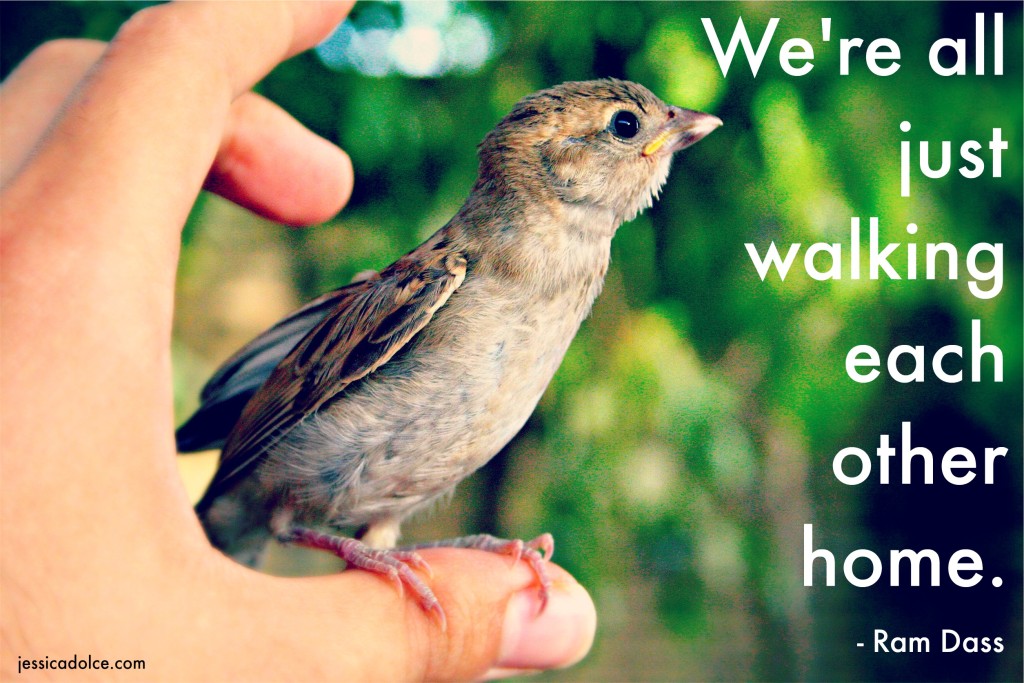7 Ways We Can Support Mental Health in the Animal Welfare Community

“Look how involved we all are just under the surface, and let’s try to help each other.”
Doing animal welfare work is intense emotional labor. It takes a toll on every single one of us working to meet the needs of animals and people who are suffering, traumatized, and in need of our ongoing compassionate care.
We can and must take daily actions to care for ourselves as we engage in this challenging work. Only we can take care of ourselves. No one else can do that for us.
But we also need each other. We need the support and understanding that only people who do this unique work can offer one another. We can’t thrive in isolation. Connection is critical to our health.
The quality of that connection matters. For example, research reveals that having coworkers who are supportive and collaborative can increase our compassion satisfaction levels, which helps to lower compassion fatigue.
The flip side of that coin is to acknowledge that we are also capable of, and often do, cause each other as much pain as the work itself does.
Rather than feed into an environment of horizontal violence, we can instead choose to create a culture that supports well-being and where our values of compassion towards animals extends to the human animals around us as well. Even when we disagree with each other, we can choose to reduce the amount of harm we inflict on ourselves and those around us.
Here are just a few ideas for supporting mental health in our community:
1. Stop bullying. The hateful comments attacking individuals and organizations that are being posted on Facebook and beyond aren’t benign or helpful. They are causing extreme suffering in our community.
Our actions can create painful conditions for others which may have a serious impact on their mental health. Let me put it this way: Suicide is often the result of multiple risk factors and while there is no particular set risk factors that accurately predicts imminent danger of suicide, there are a number of stressful situations or events that may increase the likelihood of a suicide attempt or death, such as: a previous suicide attempt, extreme loss, harassment, an active suicide cluster in a community, mental illness, bullying, isolation, and severe stress.
While we can’t control if someone has a mental illness, we can control our own actions and make the choice not to bully or harass others, no matter how much we disagree with them.
Before you post a nasty comment do this: Pause. Take a deep breath. Direct your awareness inward. What are you feeling right now? Pain? Sadness? Anger? Hopelessness? When we lash out it’s often an attempt to pass the pain along and avoid our own difficult emotions.
What pain is the bullying and trolling temporarily numbing out for you?
Take responsibility for yourself. Feel your emotions. Be sad. Be angry. Have compassion for your own suffering. You will do less harm to yourself and others if you process your emotions. Then use your energy to make concrete positive changes for animals in your corner of the world.
Do not confuse hateful comments that hurt with constructive actions that help.
2. Organize peer support groups. We need to talk about what we experience at work on a regular basis, so that we can process and let go of what we see and do in a healthy and constructive way. We understand each other’s trauma and sorrow. Friends, family, and others may be traumatized or have a hard time understanding our work. We can’t expect them to be the only source of support for us or be able to listen to our stories each day.
Form a support group that meets weekly or monthly. You can do it online with peers in your field or at work (managers, make sure there is time for this). Bring in a counselor to facilitate one or more sessions to help you get started. Connect with professionals, mentors, managers, and peers who can bear witness and help you process both the details, but even more importantly, your feelings about your work.
Learn four different ways to debrief, including what managers need to know about having a critical incident debriefing plan.
Here’s some advice on creating a peer support group.
Also of note: In Defense of Animals has a free support hotline for animal rights activists.

3. Help create healthy boundaries. Can’t stop thinking about work even when you’re off the clock? We can help ourselves and others by creating a ritual to download and decompress before we leave work.
Here’s one way to do that: Jackie Burke, clinical director of Rape and Domestic Violence Services Australia recommends meeting with your boss, a supportive work peer who is still on the clock, or a notebook to talk or write about the upsetting things that happened that day and what you will do to try to feel ok about it, before you go home.
Do this every day. Record your feelings related to the work day before you punch out (literally or figuratively, if you work at a home-based rescue). The goal is immediate reflection to avoid repression of the traumatic content you’ve accumulated all day and to avoid getting stuck in rumination later.
Organizations also need to step up their boundary game, so that staff can care for themselves. Read more here.
4. Be #StigmaFree. Help break down the misinformation and stigma around mental illness and seeking mental health help. Mental illnesses, such as depression and PTSD, are not the result of personal weakness.
1 in 5 adults in America lives with a mental health condition and suicide is the 10th leading cause of death in the U.S. So many of us are suffering. No one should feel alone, shamed, or stigmatized.
Mental health, just like physical health, exists on a continuum. At one time or another, due to many factors, all of us will need a doctor’s help to maintain or treat our physical body. It’s the same with our mental health! Many of us would benefit from having some outside help from a professional to support our emotional well-being. There’s no shame in that, just like there’s no shame in having strep throat and seeing your physician for treatment.
We can break down stigmas by sharing our own experiences and resources. If you have a great therapist that understands your work with animals, let your coworkers and friends know that you are receiving help in this way and share your counselor’s number. Make sure your staff knows about their mental health benefits and if they don’t have any, see what you can do to fix that. Let those around you know that you understand what they’re going through, that they’re not alone, and that help is available.
Learn how to be a light in the darkness.
5. Get proactive about your own mental health. This work is so tough. Although compassion fatigue is a normal consequence of the work we do – it is not a mental illness – many of us would benefit from some extra support at one time or another.
Do some research and get help now, before you are in crisis. It’s smart and courageous to get yourself into therapy or reach out to a pastor or counselor while you are still pretty much OK. You can start by investigating what your insurance does or doesn’t cover and researching therapists in your area that have experience with secondary traumatic stress or the human-animal bond.
Set yourself up with support today, which will not only help you stay well, but if the poop does hit the fan in the future, you’ll already have someone competent in your corner. Be aware that you may not find the right therapist the first go around. It’s a relationship and you may need to meet a few people before you find the right match for yourself.
Get your mental health plan in place now.
Here are some resources for getting help:
Look up therapists on PsychologyToday.com or GoodTherapy.org
6. Create a martyr-free zone. Suffering is not a competitive sport. Animal welfare doesn’t need any more self-sacrificing heroes. The people I admire most are the ones who recognize their limits and commit to taking care of themselves, so that they can perform ethical, effective work for the long haul.
Instead of bragging about not sleeping or being too busy to care for ourselves, let’s encourage each other and our staff to take bathroom and lunch breaks, vacations, and make regular visits to the doctor or the gym. No guilt trips or unnecessary interruptions when others are off the clock or need to say “no.” We can can celebrate limits, rest, and renewal, knowing that this investment in ourselves is what allows us to show up and do great work for many years to come.
The depth of our self-denial and suffering does not determine the value of our service.
Let’s put an end to praising and promoting poor quality of life. We can be well and do good. In fact, we must do both. We’ll save more lives (including our own) that way…
7. Increase understanding of suicide prevention. Many people are uncomfortable with the topic of suicide. But too many of us are taking our own lives, so we must talk about it openly. If it’s left hidden in secrecy, then we can’t implement effective prevention. Let’s commit to dispelling the myths around suicide, understanding the risk factors, and increasing our competency in helping to prevent suicides.
Get familiar with the warning signs, know how to take action, and always remember that connection – knowing that someone out there sees and cares about us – makes a major difference.
Going back to #1: your actions matter. Suicide prevention is up to all of us.
Resources for prevention training:
A state by state guide to suicide prevention trainings and resources
A comprehensive list of gatekeeper programs
Important numbers to know if you or someone you know is having suicidal ideations:
911: call if an attempt has been made, a weapon is present, and/or the person is out of control.
800-273-TALK (1-800-273-8255) National Suicide Prevention Hotline: 24-7 help that’s anonymous, connecting you to local resources that can help if you or someone you know is in crisis.
State crisis hotlines: Research your local hotline numbers. For example, there is Maine Crisis Hotline answered 24-7 with crisis workers who are mobile and can go to any site that is safe.
These are all steps that we can take to increase positive conditions and support mental health in our community.
We all need to make an effort to shift to a more healthy and positive workplace culture, which includes characteristics such as: providing support for one another, offering kindness and compassion when others are struggling, avoiding blame and forgiving mistakes, and treating one another with respect, gratitude, trust, and integrity.
Let’s make a commitment to one another to help create a culture, within the larger animal welfare community and in our daily work, that promotes health, wellness, and respect for each other. Because we’re all in this together.
What else can we do? Tell me in the comments.
Let's Stay Connected.
Sign up for ideas, updates, and your free copy of The ABCs of Self Care Workbook!
I heart boundaries and will never sell your email address. Unsubscribe at any time.

